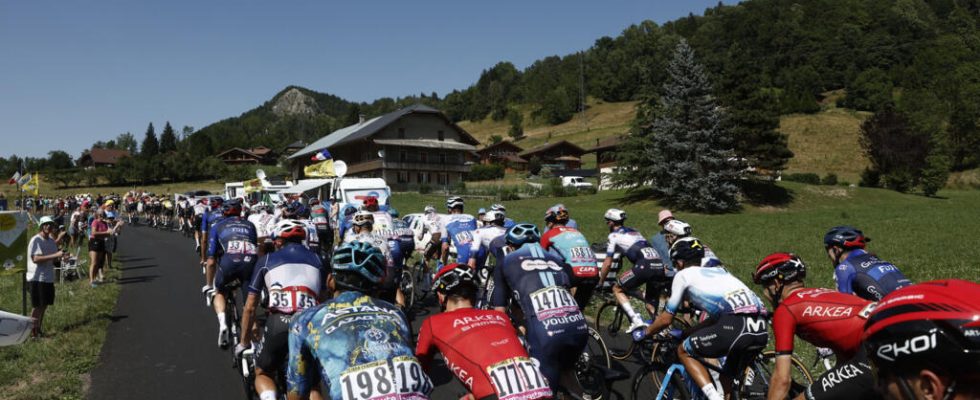Status quo on the Tour de France: Jonas Vingegaard, yellow jersey, and his runner-up Tadej Pogacar were neutralized on July 16, Sunday in the Alps. The Slovenian is still 10 seconds behind the Dane in the general classification. Monday is the rest day. Usually, it is a day of announcements, transfer of riders, or renewal of partnership between sponsors and teams. For some, the economic model is very fragile and some formations regularly alert on the state of their finances.
3 mins
The disappearance of the Breton team B&B Hôtel last year, for lack of a sponsor, reminded us of the harsh economic reality of the peloton. No ticket office, no TV rights as is the case in football. A team’s resources are mainly based on sponsorship: a brand that decides to invest for its image and visibility. Twenty million euros per year is, for example, the budget of the Groupama-FDJ team. ” You have to be careful what you do, and stay within the nails of what you have set with the partnersexplained his general manager Marc Madiot at the start of the season to our colleagues at Telegram, I often tell my riders and my management that you should never forget one thing: the partners are not obliged to have a cycling team, that is not their job. You must never lose sight of it “.
ASO in the viewfinder
Sponsorship represents 85% of the training budget of AG2R la Mondiale, according to Vincent Lavenue, director of the Savoyard team. So, the discontent rises especially within the French teams. They no longer want to live under the threat of a sponsor defection. They need to find new resources.
In this context, ASO, the organizer, among others, of the most famous and publicized race in the world, the Tour de France, is singled out. Participating in the Tour de France would even cost the teams money: not enough reimbursement of expenses, bonuses that are too low and poorly distributed…
Read alsoTour de France: Wout Poels wins the stage, draw between Pogacar and Vingegaard
There are two and a half million euros in prize money on the Tour, but the top three teams UAE Team Emirates, Jumbo Visma and Ineos Grenadiers share the biggest slice of the cake.
Xavier Jan, president of the National Cycling League (LNC) explained the newspaper West France one ” runner finishing tenth in the Tour brought in 3800 euros to his training. For the 21st, this figure drops to 1000 euros. Faced with inflation, this remains too low, explained Marc Madiot at the start of the season: “ The participation allowances allowed us to cover our costs, but today, we are in permanent deficit. There has been no reassessment of these allowances for more than ten years. On the Tour last year, over eight days of racing, I had certain riders who accumulated more fines than prizes won »
The French teams also criticize unfair tax competition. They ask for fairness, more runoff, and call on the major race organizers to redistribute better.
Tough competition from semi-state teams
Most of the companies that can still finance a cycling team are gambling operators (the FDJ, the Belgian Lotto), food distributors (Lidl or Jumbo), and even a giant in the petrochemical industry (the British Ineos ). But, in recent years, states have directly funded teams. This is the case of Kazakstan with Astana whose results are not there this season. The most symptomatic scenario remains the petromonarchies of the Gulf: the United Arab Emirates finance the team of star Tadej Pogacar, Bahrain won this Sunday’s stage with Wout Poels (Team Bahrain Victorious), and this year , the Saudi town of Alula has become a co-sponsor of the Australian team Jayco.
From soft power to bicycle sauce which, in view of oil revenues, does not cost these countries so much: 35 million euros budget for UAE Team Emirates and already two Tours de France on the clock… Why not, d elsewhere, a third at the end of the week?
